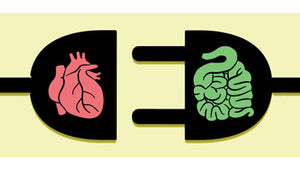Down in the Gut
September 20, 2018

What is Depression?
Depression is a mood disorder that can cause a persistent and overwhelming feeling of sadness. It affects people mentally, emotionally and physically. For some it is an occasional feeling, and for others it is deep and daily, and drastically reduces the quality of life.
Some of the symptoms are obvious, like hopelessness and the previously mentioned sadness, but depression can also include a short fuse and angry outbursts, loss of sleep and a loss of interest in things that used to make people happy, including sex. People have also reported feeling tired, anxious, and having little to no appetite.
There Is Always Hope!
Depression is finally getting the real attention it deserves. For the longest time it was a taboo subject, but now people are more freely and openly discussing it with friends and family. This is an essential first step. A support system is key, and in addition to talking to your loved ones, consulting your doctor is always a good idea. Help is out there, but you have to ask for it.
Prescription anti-depressants or anti-anxiety medications have a wide variety of side effects. These range from dry mouth to dizziness, heart irregularities and an increased risk for suicide. Probiotics could offer a safe and effective way to regulate mood and reduce feelings of anxiety or depression without the side effects of prescription medications. Good health and good moods often go hand in hand.
Meet Brain #2 – Your Gut
Research has shown that good gut bacteria benefits the human body. It helps with the absorption of vitamins, minerals and nutrients and builds our immune health. And now research is looking at the interaction between gut bacteria and the brain, and the way our brain functions and mood are affected.
The brain connects with the gut through nerves that make up the automatic nervous system. This is why we literally feel stress in our stomachs, with butterflies, nausea or stomach discomfort. During stressful times, the sympathetic nervous system causes what is known as “fight or flight.” This is fascinating subject on its own, and learning how to deal with it is a study course in itself. It is often addressed with soldiers and law enforcement officials.
The key is to know your triggers, know when you are in the situation and try to breathe and relax your body and mind. Being in a place of calm is always better for decision-making. We may not have control on outside events, but we do have control over our own choices. So where do probiotics fit into all of this?
Probiotics For A Good Mood
Gut bacteria produce neurotransmitters including serotonin, the same brain chemical in the brain that regulates mood. Friendly gut bacteria (Probiotics) have the ability to make serotonin, as well as other chemicals involved in mood and behavior. The study of probiotics and mood is significant and ongoing.
Depression has also been linked with increased production of inflammatory chemicals called cytokines, which influence brain activity and contribute to stress-related symptoms. Certain species of probiotic bacteria may help keep inflammation in check, which positively influences the immune system. More research is needed to look at both serotonin and cytokines and how they are affected by probiotics, but studies are promising. What is clear is that the health of the gut and the health of the mind are definitely linked.
Probiotics have many health benefits. Digestive health and building a strong immune system are the ones most people know about. The idea that probiotics can also serve as a natural alternative to prescription medication for mood disorders should make people happy in itself. A natural good mood would be an amazing thing.
Keeping the gut healthy and good, means keeping us healthy and good. It’s the gut, body and brain working together and in harmony. Our moods and depression are also found down in the gut. Probiotics may be able to naturally lift us back up.
The post DOWN IN THE GUT appeared first on Natren Probiotics Blog.





Leave a comment